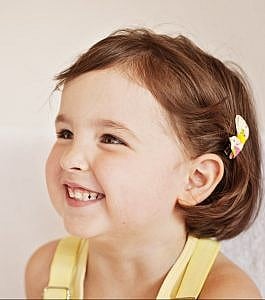Baby teeth (or primary teeth) are the first teeth that your child gets and they are crucial to their health and development. Baby teeth help you eat, speak, and smile. They are placeholders for your adult teeth that will eventually grow into place. Protecting your child’s baby teeth with good oral health can make a huge difference in their overall health and development.
When Do Baby Teeth Start Coming In?
 Baby teeth typically start poking through at anywhere from 6 months to a year in age. Usually, by the age of 3, your child should have all 20 of their primary teeth. These teeth allow your baby to chew, they help them begin to talk, and smile. Typically the central incisors come in first (bottom, then top), then the lateral incisors, then the canines, and finally the molars. While every child is different, their teeth typically develop in this order.
Baby teeth typically start poking through at anywhere from 6 months to a year in age. Usually, by the age of 3, your child should have all 20 of their primary teeth. These teeth allow your baby to chew, they help them begin to talk, and smile. Typically the central incisors come in first (bottom, then top), then the lateral incisors, then the canines, and finally the molars. While every child is different, their teeth typically develop in this order.
Once your child’s teeth do start emerging, you can start taking care of them. Gently brushing their teeth with a very small amount of toothpaste (about the size of a grain of rice) and eventually flossing (when teeth come in next to each other) protects baby teeth from decay. If primary teeth are lost too early, adult teeth can begin to push into the gaps and create problems down the road.
Tips To Soothe Your Teething Child
As your baby’s teeth start coming in, it can be painful and irritating to them. Try some of these tips to help ease their pain:
- Massage their gums – Sometimes applying a little pressure can help dull the pain.
- Give them something cold (not frozen) – A cold spoon, or some chilled fruit or water can help. Make sure what you give them isn’t frozen or it could stick to their gums!
- Teething toys or rings – Babies like to put things in their mouths. Toys or rings that are baby safe (meaning they are safe to be in babies mouths) can help dull their gum pain.
- Break out the sippy cup – If your baby is older than 6 months, offering them their sippy cup filled with cool water to suck on can help.
- Distraction – Sometimes simply removing them from their environment and changing the scenery is enough to distract your baby and give them temporary relief from their pain.
There are so many tips out there to help soothe teething pain, these are only some of the most common suggestions. If you want to try something out, check out this article that compiles a more complete list: 27 Must-Know Tips to Quickly Soothe a Teething Baby.
When Should Adult Teeth Start Coming In?
The first adult teeth start coming in around the age of 6, and by 13 or 14 all 28 permanent teeth are typically in. In rare cases, some people never lose their baby teeth and retain them for the rest of their lives.
How Soon Is Too Soon To Bring Your Child to the Dentist?
Really as soon as your child’s primary teeth start coming in you can bring your child to the dentist. The real benefit of bringing your child into the dentist office is so that they can be comfortable with the dentist and familiarize themselves with the office. Fear of the dentist is common and the earlier they’re exposed to the dentist, the more comfortable they’ll be.
At Park Avenue we want your whole family to feel comfortable at the dentist, regardless of their age. It’s never too early to start thinking about your baby’s oral health, schedule an appointment today and develop a care plan for your child’s baby teeth.
